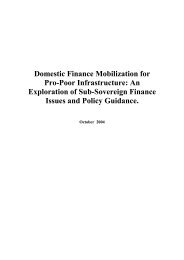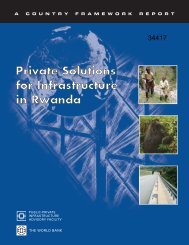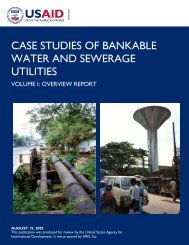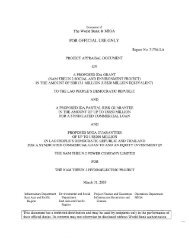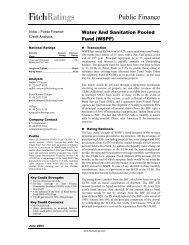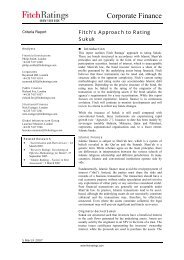EAP - The Pacific Infrastructure Challenge - World Bank (2006).pdf
EAP - The Pacific Infrastructure Challenge - World Bank (2006).pdf
EAP - The Pacific Infrastructure Challenge - World Bank (2006).pdf
You also want an ePaper? Increase the reach of your titles
YUMPU automatically turns print PDFs into web optimized ePapers that Google loves.
<strong>Pacific</strong> countries, management salaries in public corporations or corporatized entities<br />
are set at the same level as government department officials. To attract the right<br />
people, it may be necessary to set remuneration at a higher level.<br />
Governments may argue that this imposes an unnecessary additional financial burden<br />
on the service provider. However, if the appointed individual was able to turn the<br />
entity into an efficient unit which recovers its costs and provides good quality<br />
services, the benefits may far outweigh the costs. Another option is to employ<br />
managers on performance contracts, where extra pay is linked to actual performance<br />
to drive improvements.<br />
Another impediment to good public sector reform in many <strong>Pacific</strong> countries is<br />
government reluctance to support staff layoffs. Because job opportunities are limited<br />
in many <strong>Pacific</strong> countries, this is a particularly sensitive issue for many governments.<br />
However, keeping staff on who do not add any value, or forcing organizations to reappoint<br />
staff that have already been made redundant (such as was the case in the<br />
airports sector in Fiji), provides very poor incentives for efficiency and improved<br />
performance. Governments would do better to support leaner service providers,<br />
while providing support to ex-staff members and other individuals to develop small<br />
businesses that compete to provide important contract services. This initiative was<br />
employed successfully by Fiji’s electricity authority when trying to reduce staff<br />
numbers to an efficient level. A number of staff took voluntary redundancy<br />
packages, and now provide services to the utility on a contract basis.<br />
If staff layoffs are too disruptive and politically unacceptable and keeping staff on is a<br />
stated ‘social obligation cost’, then governments should support service providers<br />
keeping these staff on at a minimum wage and changing their roles to better suit their<br />
skills. This is the strategy employed at Nadi airport. Airport management were not<br />
allowed to make cleaning staff redundant, so they were redeployed to perform other<br />
‘value-added’ activities, such as porter services or serenading services for arriving<br />
tourists. While this does not get rid of the financial burden imposed by employing<br />
more staff than is necessary for efficient operation, it does not continue to reward<br />
existing staff for work they are unsuited to and are not skilled at and offers some<br />
incentives for improved performance.<br />
Output Based Aid (OBA) programs can help to make Public Sector Reforms more<br />
successful. Output Based Aid is an innovative way of delivering targeted subsidies. It<br />
differs from conventional subsidy mechanisms in that the subsidy payment is tied to<br />
the delivery of a specific output, for example installing a water connection. OBA<br />
mechanisms are discussed in more detail in Box 7.6.<br />
50



